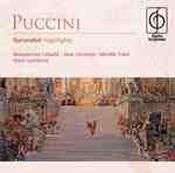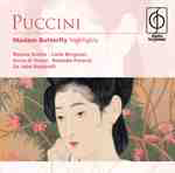
30 Mar 2008
Classics for Pleasure opera highlights: Puccini
With single CD versions of full-length operas, isn't the term "highlights" presumptuous?
The Sixteen continues its exploration of Henry Purcell’s Welcome Songs for Charles II. As with Robert King’s pioneering Purcell series begun over thirty years ago for Hyperion, Harry Christophers is recording two Welcome Songs per disc.
In February this year, Albanian soprano Ermonela Jaho made a highly lauded debut recital at Wigmore Hall - a concert which both celebrated Opera Rara’s 50th anniversary and honoured the career of the Italian soprano Rosina Storchio (1872-1945), the star of verismo who created the title roles in Leoncavallo’s La bohème and Zazà, Mascagni’s Lodoletta and Puccini’s Madama Butterfly.
Collapsology. Or, perhaps we should use the French word ‘Collapsologie’ because this is a transdisciplinary idea pretty much advocated by a series of French theorists - and apparently, mostly French theorists. It in essence focuses on the imminent collapse of modern society and all its layers - a series of escalating crises on a global scale: environmental, economic, geopolitical, governmental; the list is extensive.
Amongst an avalanche of new Mahler recordings appearing at the moment (Das Lied von der Erde seems to be the most favoured, with three) this 1991 Mahler Second from the 2nd Kassel MahlerFest is one of the more interesting releases.
If there is one myth, it seems believed by some people today, that probably needs shattering it is that post-war recordings or performances of Wagner operas were always of exceptional quality. This 1949 Hamburg Tristan und Isolde is one of those recordings - though quite who is to blame for its many problems takes quite some unearthing.
The voices of six women composers are celebrated by baritone Jeremy Huw Williams and soprano Yunah Lee on this characteristically ambitious and valuable release by Lontano Records Ltd (Lorelt).
As Paul Spicer, conductor of the Royal Birmingham Conservatoire Chamber Choir, observes, the worship of the Blessed Virgin Mary is as ‘old as Christianity itself’, and programmes devoted to settings of texts which venerate the Virgin Mary are commonplace.
Ethel Smyth’s last large-scale work, written in 1930 by the then 72-year-old composer who was increasingly afflicted and depressed by her worsening deafness, was The Prison – a ‘symphony’ for soprano and bass-baritone soloists, chorus and orchestra.
‘Hamilton Harty is Irish to the core, but he is not a musical nationalist.’
‘After silence, that which comes closest to expressing the inexpressible is music.’ Aldous Huxley’s words have inspired VOCES8’s new disc, After Silence, a ‘double album in four chapters’ which marks the ensemble’s 15th anniversary.
A song-cycle is a narrative, a journey, not necessarily literal or linear, but one which carries performer and listener through time and across an emotional terrain. Through complement and contrast, poetry and music crystallise diverse sentiments and somehow cohere variability into an aesthetic unity.
One of the nicest things about being lucky enough to enjoy opera, music and theatre, week in week out, in London’s fringe theatres, music conservatoires, and international concert halls and opera houses, is the opportunity to encounter striking performances by young talented musicians and then watch with pleasure as they fulfil those sparks of promise.
“It’s forbidden, and where’s the art in that?”
Dublin-born John F. Larchet (1884-1967) might well be described as the father of post-Independence Irish music, given the immense influenced that he had upon Irish musical life during the first half of the 20th century - as a composer, musician, administrator and teacher.
The English Civil War is raging. The daughter of a Puritan aristocrat has fallen in love with the son of a Royalist supporter of the House of Stuart. Will love triumph over political expediency and religious dogma?
Beethoven Symphony no 9 (the Choral Symphony) in D minor, Op. 125, and the Choral Fantasy in C minor, Op. 80 with soloist Kristian Bezuidenhout, Pablo Heras-Casado conducting the Freiburger Barockorchester, new from Harmonia Mundi.
A Louise Brooks look-a-like, in bobbed black wig and floor-sweeping leather trench-coat, cheeks purple-rouged and eyes shadowed in black, Barbara Hannigan issues taut gestures which elicit fire-cracker punch from the Mahler Chamber Orchestra.
‘Signor Piatti in a fantasia on themes from Beatrice di Tenda had also his triumph. Difficulties, declared to be insuperable, were vanquished by him with consummate skill and precision. He certainly is amazing, his tone magnificent, and his style excellent. His resources appear to be inexhaustible; and altogether for variety, it is the greatest specimen of violoncello playing that has been heard in this country.’
Baritone Roderick Williams seems to have been a pretty constant ‘companion’, on my laptop screen and through my stereo speakers, during the past few ‘lock-down’ months.
Melodramas can be a difficult genre for composers. Before Richard Strauss’s Enoch Arden the concept of the melodrama was its compact size – Weber’s Wolf’s Glen scene in Der Freischütz, Georg Benda’s Ariadne auf Naxos and Medea or even Leonore’s grave scene in Beethoven’s Fidelio.

With single CD versions of full-length operas, isn't the term "highlights" presumptuous?
Just because most, if not all, of the better-known pieces from a particular work have been included, that doesn't necessarily make the performances highlights of those particular sets. "Selections" might be the more modest term.
 EMI prompted the above thought with a new line of "highlights" from its extensive catalog, released on its budget Classics for Pleasure series. (No, you won't find Moses und Aron or Lulu on its Classics Not for Pleasure series). Consider two discs of "highlights" from Puccini operas. Sir John Barbirolli's classic Madam Butterfly (the "a" of "Madama" dropped for no clear reason) boasts a fine cast: Renata Scotto, Carlo Bergonzi, and Rolando Panerai. In its glorious entirety, this recording has a cumulative power, with much beautiful orchestral detail revealed through Barbirolli's sensitive, if slow-paced, leadership. Although Scotto's top, even at this relatively early stage of her career, reveals some of the metallic edge that would later characterize her high notes, her assumption of Cio-cio san deserves its high reputation. Not much of Bergonzi's elegant Pinkerton can be judged by this highlights set, however. He is heard in the love duet and his act two aria, but the set omits the act one arias. At only 55 minutes, the excuse can't be the CD timing. Beginning with Butterfly's entrance, only about 15 minutes of the first act appears. The second act gets fuller coverage, with the essential Butterfly/Sharpless conversation, the lovely duet with Scotto and Anna di Stasio's Suzuki, and then closing with the opera's last 18 minutes. The single-fold booklet contains a synopsis with numbered references to the track listing.
EMI prompted the above thought with a new line of "highlights" from its extensive catalog, released on its budget Classics for Pleasure series. (No, you won't find Moses und Aron or Lulu on its Classics Not for Pleasure series). Consider two discs of "highlights" from Puccini operas. Sir John Barbirolli's classic Madam Butterfly (the "a" of "Madama" dropped for no clear reason) boasts a fine cast: Renata Scotto, Carlo Bergonzi, and Rolando Panerai. In its glorious entirety, this recording has a cumulative power, with much beautiful orchestral detail revealed through Barbirolli's sensitive, if slow-paced, leadership. Although Scotto's top, even at this relatively early stage of her career, reveals some of the metallic edge that would later characterize her high notes, her assumption of Cio-cio san deserves its high reputation. Not much of Bergonzi's elegant Pinkerton can be judged by this highlights set, however. He is heard in the love duet and his act two aria, but the set omits the act one arias. At only 55 minutes, the excuse can't be the CD timing. Beginning with Butterfly's entrance, only about 15 minutes of the first act appears. The second act gets fuller coverage, with the essential Butterfly/Sharpless conversation, the lovely duet with Scotto and Anna di Stasio's Suzuki, and then closing with the opera's last 18 minutes. The single-fold booklet contains a synopsis with numbered references to the track listing.
Only a few years after Montserrat Caballé's classic performance as Liu in the Zubin Mehta Turandot, the soprano moved up to the title role. Joan Sutherland, under Mehta, had used her huge voice to convey both the fierceness and underlying passion of the "ice princess." Caballe sings the role beautifully, no doubt, but the darker edge is naggingly absent. On the credit side, the riddle scene of act two probably never sounded so melodic. José Carreras, a frequent recording partner of Caballé, retains his beautiful middle voice in this 1977 recording, but the top, frequently called on for Calaf, already sounds unpleasantly pushed. Mirella Freni doesn't try to compete with the lovely floating tones of Caballé's Liu from the earlier set. Instead, Freni sings a more full-blooded Liu, with all the passion for the Unknown prince. Not much is heard in this highlights set of Paul Plishka's Timur or Ping, Pang, and Pong. The set times out at a miserly 53 minutes.
Some may respond to Alain Lombard's deliberateness and delicacy, but your reviewer found the conducting ponderous and fussy. Unless one is a huge Caballé fan, the Mehta set remains the version of choice, whether as a complete set or in highlights form. With the Butterfly, true lovers of the opera should seek out the complete set.
Chris Mullins